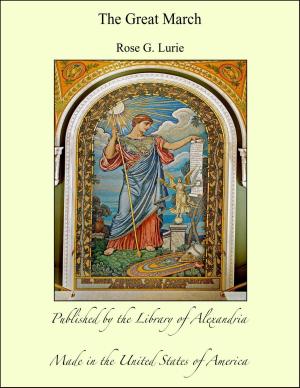| Author: | Sir Arthur Thomas Quiller-Couch | ISBN: | 9781465594082 |
| Publisher: | Library of Alexandria | Publication: | March 8, 2015 |
| Imprint: | Language: | English |
| Author: | Sir Arthur Thomas Quiller-Couch |
| ISBN: | 9781465594082 |
| Publisher: | Library of Alexandria |
| Publication: | March 8, 2015 |
| Imprint: | |
| Language: | English |
Sergeant Archelaus shook his head. "What's the use?" he asked. "'Tis but puttin' off the evil day. If Her Majesty won't send us clothes, we must fall back on Providence. Besides which, I've taken the edge off these things, and don't want to begin over again. Last Wednesday I wore 'em over to the Off Islands, to practise 'em on the sea-birds; and last evening after dusk I walked through the town with 'em—yes, sir, right out past the church and back again, my blood being up, and came home and cut a square out of the old ones to wrap round the bung of the water-butt." The Commandant eyed the sergeant's legs in silence, choking down half-a-dozen angry criticisms. No; he could not trust himself to speak; and, after a minute, cramming his clenched fists into the pockets of his frayed fatigue-jacket, he swung about on his heel and walked out of the garden with angry strides. Was the Lord Proprietor making sport of him?—purposely making him and his garrison the laughing-stock of the Islands? The Commandant walked up the road with a hot heart: past the Barracks and beyond them to the down, where a ruined windmill overlooked the sea. He wanted to be alone, and up here he could count upon solitude. He wanted to walk off his ill-humour. But the ascent was steep, and he, alas! no longer a young man; and at the windmill he was forced to stand still and draw breath. At his feet lay the Islands, bathed in the light of a fast-reddening October sunset. Against such a sunset, if the air be very clear, you may see them from the cliffs of the mainland—a low, dark cloud out in the Atlantic; and in old days the Commandant had repined often enough at the few leagues which then had cut him off from the world, from active service, from promotion. Gradually, as time went on, he had grown resigned, and with resignation he had learnt to be proud of his kingdom—for his kingdom de facto it was. The Islanders had used to speak of him sometimes as The Commandant, but oftener as The Governor. (They never called him The Governor nowadays.) His military establishment, to be sure—consisting of a master-gunner, four other gunners, and two or three aged sergeants—scarcely accorded with his rank of major; but by way of compensation he was, as President of the Council of Twelve, the chief civil magistrate of the Islands.
Sergeant Archelaus shook his head. "What's the use?" he asked. "'Tis but puttin' off the evil day. If Her Majesty won't send us clothes, we must fall back on Providence. Besides which, I've taken the edge off these things, and don't want to begin over again. Last Wednesday I wore 'em over to the Off Islands, to practise 'em on the sea-birds; and last evening after dusk I walked through the town with 'em—yes, sir, right out past the church and back again, my blood being up, and came home and cut a square out of the old ones to wrap round the bung of the water-butt." The Commandant eyed the sergeant's legs in silence, choking down half-a-dozen angry criticisms. No; he could not trust himself to speak; and, after a minute, cramming his clenched fists into the pockets of his frayed fatigue-jacket, he swung about on his heel and walked out of the garden with angry strides. Was the Lord Proprietor making sport of him?—purposely making him and his garrison the laughing-stock of the Islands? The Commandant walked up the road with a hot heart: past the Barracks and beyond them to the down, where a ruined windmill overlooked the sea. He wanted to be alone, and up here he could count upon solitude. He wanted to walk off his ill-humour. But the ascent was steep, and he, alas! no longer a young man; and at the windmill he was forced to stand still and draw breath. At his feet lay the Islands, bathed in the light of a fast-reddening October sunset. Against such a sunset, if the air be very clear, you may see them from the cliffs of the mainland—a low, dark cloud out in the Atlantic; and in old days the Commandant had repined often enough at the few leagues which then had cut him off from the world, from active service, from promotion. Gradually, as time went on, he had grown resigned, and with resignation he had learnt to be proud of his kingdom—for his kingdom de facto it was. The Islanders had used to speak of him sometimes as The Commandant, but oftener as The Governor. (They never called him The Governor nowadays.) His military establishment, to be sure—consisting of a master-gunner, four other gunners, and two or three aged sergeants—scarcely accorded with his rank of major; but by way of compensation he was, as President of the Council of Twelve, the chief civil magistrate of the Islands.















